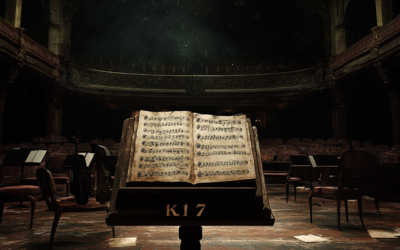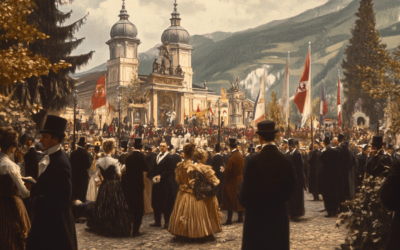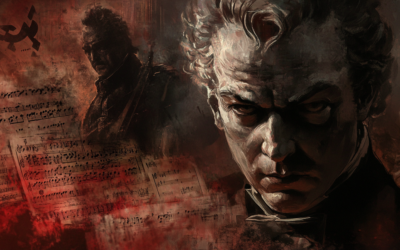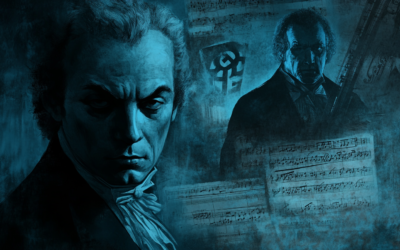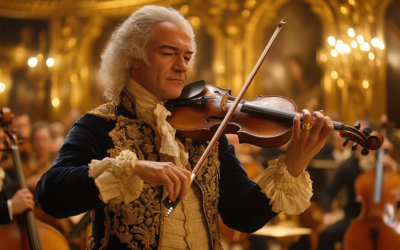Mozart Noir
The Hidden Influence of Joseph Boulogne, Chevalier de Saint-George
Joseph Boulogne, Chevalier de Saint-George, known as the “Black Mozart”, was a celebrated composer, violinist, and conductor in 18th-century Paris. Yet, his name is barely whispered in classical music circles, overshadowed by the very man whose career he helped define. Born in 1739 in Guadaloupe to a wealthy Frenchman and an enslaved African woman, Saint-George became a leading figure in Parisian music long before Mozart’s arrival, directing the famous Concert des Amateurs and influencing what we now call the Classical style. Saint-George’s influence on Mozart is undeniable, yet rarely acknowledged.
Mozart’s two Sinfonie Concertanti for violin and viola (K.364 and K.445) are often hailed as masterpieces of his “Viennese” style. However, there’s something curious about them: both works share the same orchestral arrangement as Saint-George’s own concertantes, and their innovative viola tuning—half a tone higher—echoes the daring style Saint-George employed years earlier. While historians date these works to 1779, they conveniently forget that Saint-George had already established this style in Paris a decade before.
Mozart: The Fall of the Gods
This book compiles the results of our studies on 18th-century music and Mozart, who has been revered for over two centuries as a deity. We dismantle the baseless cult of Mozart and strip away the clichés that falsely present him as a natural genius, revealing the contradictions in conventional biographies. In this work, divided into two parts, we identify and critically analyze several contradictory points in the vast Mozart bibliography. Each of the nearly 2,000 citations is meticulously sourced, allowing readers to verify the findings. This critical biography of Mozart emerges from these premises, addressing the numerous doubts raised by researchers.
"Saint-George's style was so advanced that even Beethoven would later adopt elements of his work, something Mozart—still clinging to his father’s baroque techniques—could never have dreamed of."
Mozart: The Fall of the Gods
Mozart’s legacy has been scrubbed clean of the influences that shaped his career, particularly the black composers like Saint-George who were rewriting the musical rules long before Mozart could. Saint-George, leading Europe’s finest orchestra, the Concert des Amateurs, introduced the very techniques that would later define Mozart’s so-called “genius”. But while Saint-George was a household name in Paris, performing at the Concert Spirituel and winning critical acclaim, Mozart was still struggling for recognition, hating both Paris and its music. By the time Mozart arrived in the French capital, Saint-George had already been dazzling audiences with his pioneering Symphonies concertantes and string quartets.
“Saint-George’s style was so advanced that even Beethoven would later adopt elements of his work, something Mozart—still clinging to his father’s baroque techniques—could never have dreamed of.”
The Paradox of Mozart’s Paris Experience
Mozart arrived in Paris in 1778, despising the French musical scene. In a letter to his father Leopold, he wrote, “Doesn’t the word Paris disgust you?”. And yet, while the young Austrian raged against Parisian culture, Saint-George was flourishing. He was leading Europe’s largest orchestra, performing in front of royalty, and defining the symphonic form that would soon be labelled “Classical”. Mozart, on the other hand, was living in the shadow of Saint-George’s success.
During this period, Mozart composed his famous Sinfonia Concertante K.364. The first five notes of its opening theme bear a striking resemblance to Saint-George’s Violin Concerto Op.7 No.2, composed just months earlier. Coincidence? Unlikely. Mozart and Saint-George lived under the same roof for over two months in the summer of 1778, dining together and, almost certainly, discussing music. The so-called “Mozartian” style was already well-established in Paris, long before Mozart tried his hand at it.
The Rise of the “Black Mozart”
While Saint-George’s compositions were more forward-looking, daring in their virtuosity and orchestration, Mozart’s music was often tied to the past, anchored in the Baroque techniques taught by his father. Saint-George used a modern bow, allowing for the virtuosic passages that would later be imitated by Paganini and even Beethoven. Mozart, by contrast, relied on Leopold’s outdated baroque bowing techniques. The gap between the two composers could not have been wider.
The Forgotten Innovator
Saint-George was not merely a skilled violinist; he was a visionary. By the time he was directing Concert des Amateurs, he had already revolutionised the symphonic genre. His symphonies and Concertantes bear more resemblance to Beethoven’s daring works than anything Mozart ever attempted. And yet, when Saint-George’s music is performed today, it is often underappreciated, if it is even recognised at all.
By the time Saint-George retired from composing, his legacy was already being buried under the overwhelming cult of Mozart. It is no accident that Saint-George was dubbed the “Black Mozart”. He was the genius behind the innovations that shaped the “Viennese” style, long before Mozart could claim it as his own.
You May Also Like
A Revealing New Interview on His Thematic Catalogue
We’re excited to present a brand-new interview that challenges many of the long-held assumptions about Mozart’s Thematic Catalogue (1784–1791). Conducted by Swedish journalist Henry Grynnsten, this conversation delves into groundbreaking forensic techniques—like advanced ink analysis and digital image processing—that may change the way we view Mozart’s late works.
The Rattling Symphony: A Critical Take on K. 17
Often attributed to Mozart, the K. 17 symphony is anything but refined. Lacking orchestration and filled with gaps, it raises more questions than answers about its true authorship.
The Hidden Origins of the Salzburg Festival: A Nationalist Dream
The Salzburg Festival, far from being a mere celebration of Mozart’s genius, was born out of nationalist ambitions during a turbulent period in Austro-German history. Conceived by figures like Max Reinhardt, Heinrich Damisch, and Friedrich Gehmacher, the festival was deeply rooted in ultranationalistic ideals, transforming Mozart’s legacy into a tool for cultural dominance. The truth behind its founding has long been obscured, but the primary sources tell a different, darker story.
Mozart, Wagner, and the Nazi Myth
The Führer’s admiration for Wagner’s racially charged ideology not only influenced the policies of the Nazi regime but also reshaped the legacy of Mozart. Under National Socialism, Mozart was not celebrated as a universal genius but as a symbol of German purity and superiority. His music, stripped of its international influence, was rebranded as an expression of Aryan identity, intended to unify and inspire the German people.
Mozart, the Anschluss, and Nazi Propaganda
Following the 1938 Anschluss, the Nazi regime rebranded Mozart as the quintessential German composer, using his image to promote unity between Austria and Germany. The Salzburg Festival became a platform for Nazi propaganda, distorting Mozart’s legacy to fit their nationalistic and racial agenda.
The Violin Concertos: Mozart’s Borrowed Genius
Mozart’s violin concertos are often celebrated as masterpieces, but how much of the music is truly his? This article delves into the complexities behind the compositions and challenges the authenticity of some of his most famous works, revealing a story of influence, imitation, and misattribution.



